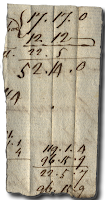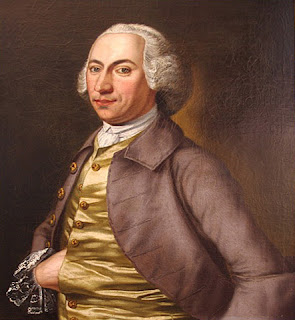 |
| The title page from the book |
Seneca's Morals
Life often takes some unexpected turns and often holds more than a few surprises. Not all off them are necessarily bad.
One surprise is to find that on my modest antiquarian bookshelf, sits Malachi Blake's copy of Seneca's Morals.
Lucius Annaeus Seneca (c1 BC - 65 AD) was born in Corduba in Spain and educated in Rome. He is considered one of the most important of the Stoic philosophers.
He was exiled after being accused of adultery with Emperor Caligula's sister. He'd previously been the adolescent Nero's... ... ahem, "tutor". On Nero's accession in 54 AD, Seneca was in favour once more and became one of the new Emperor's advisors. [i]
 |
| Seneca ordered by Nero to commit suicide, awaits death |
The ageing Seneca once again fell from grace in around AD 62 and was charged with involvement in the Pisonian Conspiracy to murder, the by now Quite Insane, Nero. In 65 AD, he was forced to commit suicide.
The book is a collection of essays written at various times during Seneca's life. Perhaps the most notable is On Mercy which directly addresses the new Emperor and is considered the prototypical "advice to princes" essay:
The Humanity and Excellence of this Virtue, is confess'd at all hands, as well by the Men of Pleasure, and those that think every Man was made for himself, as by the Stoicks, that make Man a Sociable Creature, and born for the Common good of Mankind
 |
| Blake's imprimatur from the book |
Malachi Blake was the second son of Malachi Blake (1651-1705) and was born and baptised at Blagdon in Somerset. It seems he was trained for the ministry by his father who was at first an itinerant preacher, but later settled down to life as a Presbyterian Minister of Wellington. [ii]
Malachi Senior is credited by Murch [iii] as having laid 'the foundations of the dissenting cause'. In the history of the Christian Church in Britain that makes him second only to the Devil in its hissing Angstreaktion
In 1712, Malachi junior began the first of five years of ministry in Langdon, before moving to Blanford in 1717 to become the Congregational Minister. He remained there until his death at the age of 72. [iv]
 |
| A bookmark from the volume |
He witnessed the Great Fire of Blandford on the 4th of June 1731 and later wrote an account of the blaze entitled 'A Brief Account of a Dreadful Fire at Blanford Forum'. Two editions of the work were published in 1735 and another the following year. One assumes it must have been a cracking good read.
The fire destroyed his own chapel at Blandford. The building and its contents were said to be worth the princely sum of £160. In today's terms this represents capital of about £16,000. However in terms of average earning power the sum equates to a whopping £180,000.
A fund was set up to relieve the suffering of those affected by the fire, which was just one of a series that plagued the town. [v] Authority was sought from Parliament to rebuild the settlement under greater regulation to minimise the chance of further conflagrations: [vi]
 |
| Malachi Blake II |
With a Bill, intituled, "An Act for the better and more easy re-building of the Town of Blandford Forum, in the County of Dorset; and for determining Differences touching Houses and Buildings burnt down or demolished by reason of the late dreadful Fire there;" to which they desire the Concurrence of this House.
The Malachi Blakes and their distant and considerably more famous relative Robert, who is credited with laying the foundations of British sea power and of whom Admiral Lord Nelson quipped "I shall never be the equal of Blake", are commemorated in the Bridgewater Museum.
i Katja Vogt, Seneca, Stanford Encyclopedia of Philosophy
ii. Oxford Dictionary of National Biography, Malachi Blake (bap. 1687, d. 1760): doi:10.1093/ref:odnb/2581
iii. J. Murch, A history of the Presbyterian and General Baptist churches in the west of England (1835), 244, 315
iv. A. Gordon, Freedom after ejection : a review (1690-1692) of Presbyterian and Congregational nonconformity in England and Wales (1917)
v http://www.bridgwatermuseum.org.uk/
vi Journal of the House of Lords volume 24: 1732-1737 (1767-1830), pp. 85-92
0 Replies:
Post a Comment